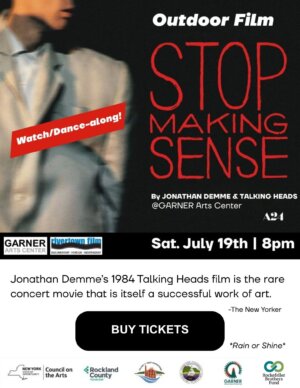The Village should restructure the way it holds meetings. Currently it is too easy to slip into a mode where very small decisions take too much of board members valuable time (and the public who attend the meetings), and HUGE decisions never get on the agenda or if they do, they are rushed. In the end, the Village Board spends all its time tending to the trees in front of its face and forgets about managing the forest.
Thursday’s meeting, which included two critical resolutions (2009/10 budget, “superblock” redevelopment) was a painful example where more time was spent on a single event in Memorial Park than on moving ahead with Nyack’s biggest redevelopment initiative since urban renewal. For the first hour the Board had a lengthy and incredibly detailed conversation about two events and a proposal that the downtown businesses would pay for parking three hours on Fridays for two months (doing the math, that’s 24 hours in total).
The Board discussed what should be staff level discussions and decisions, such as insurance and if a project needs to go to the Architectural Review Board. The Village has a Building Commissioner. It is his job to make ministerial decisions like that. And, for the record, putting covers over the Munimeters 8 times for three hours is most definitely a “temporary” sign, so should not be subjected to the ARB. It wastes a lot of peoples time (which is money) and adds to the perception that its hard to get anything done in Nyack.
I suggest the following way to restructure the meetings so that the Board can actually spend time planning and managing:
The problem is that there are only 5 board members, not enough to break up into committees. Commonly the local government legislature will have committees such as Budget/Administration and Planning/Development. The committee meetings are working meetings where no formal resolutions are passed. The time is spent to dig deeper into issues and development them for a full board discussion and formal vote. This is more efficient because many of the smaller issues are worked out ahead of time before it gets to the full board. Also, the committees are responsible for key long term issues.
Currently the Board has two meetings a month. I suggest that one of the meetings is a “Meeting of the Committees”, where no formal resolutions are passed. There should be two committees: Budget/Administration and Planning/Development. Each committee should have a Trustee as chair person who is responsible for the agenda and actually runs that part of the meeting.
At these meetings each committee can investigate the two main areas that need a lot of attention. The Budget/Administration discussion can be used to investigate how departments can be run more efficiently, and how the Village can fix its seemingly structural deficit. The Planning/Development committee can discuss land use issues like the superblock redevelopment, the zoning changes, parks development, the comprehensive plan, etc.
The Mayor’s task force on the superblock, which I was on, submitted a white paper 5 weeks ago to the board, and nothing has been done. The first thing the white paper said was the board had to decide if the redevelopment was a priority. The board had to make that decision, otherwise we stay in the holding pattern we’ve been in for the last two years, where nothing happens. The board hasn’t done anything to figure out how it would make that decision, and it took a virtual revolution by Riverspace to get it on the Mayor’s report at a Board meeting to get the ball rolling.
In the scenario I suggest, the chair of the planning/development committee would be the point person for such an issue, and it would be on the board’s agenda. The planning process would be institutionalized, so that the board would naturally take a recommendation like that and figure out how it would make such a decision if the redevelopment is a priority.
And one other important point about the meetings. There needs to be limits on how long people talk. Amazingly Josh Goldberg was the only one the entire evening to get cut off by the Board, while at the beginning of the evening there were others that talked much longer about a single issue. Setting a boundary on time would force people to be more efficient in their discussion.
The problem is that the board gets lost in the minutia of individual events and requests and never gets around to the big issues, the issues that take time to work on and develop. Everything gets turned upside down and little items get a lot of attention and huge items get ignored or rushed.
This simple change in process would help get our priorities straight.








